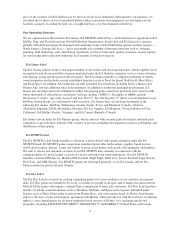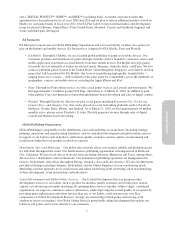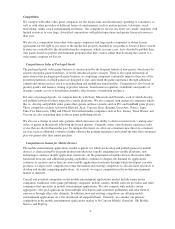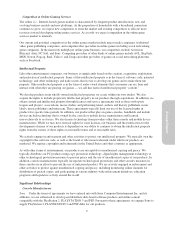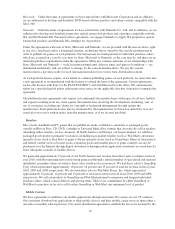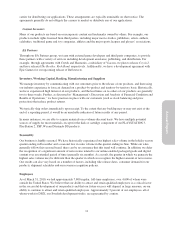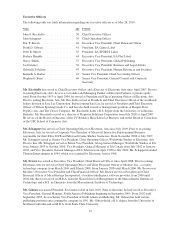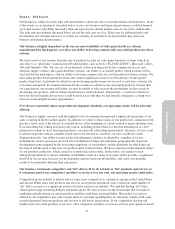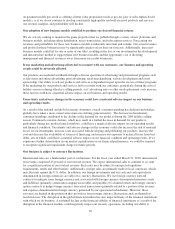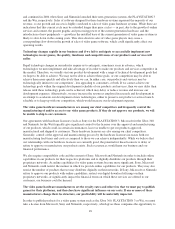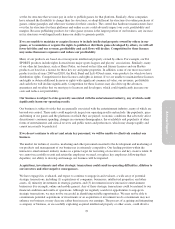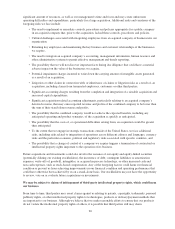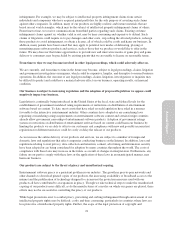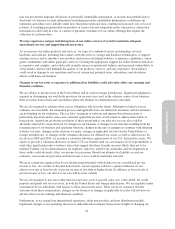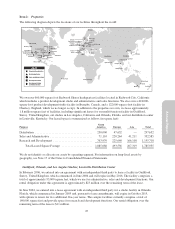Electronic Arts 2010 Annual Report Download - page 94
Download and view the complete annual report
Please find page 94 of the 2010 Electronic Arts annual report below. You can navigate through the pages in the report by either clicking on the pages listed below, or by using the keyword search tool below to find specific information within the annual report.on payment models perceived as offering a better value proposition (such as pay-for-play or subscription-based
models), or if we do not continue to develop consistently high-quality and well-received products and services,
our revenue, margins, and profitability will decline.
Our adoption of new business models could fail to produce our desired financial returns
We are actively seeking to monetize the game properties that we publish through a variety of new platforms and
business models, including online distribution, micro-transactions, and subscription services. Forecasting our
revenues and profitability for these new business models is inherently uncertain and volatile. Our actual revenues
and profits for these businesses may be significantly greater or less than our forecasts. Additionally, these new
business models could fail for one or more of our titles, resulting in the loss of our investment in the development
and infrastructure needed to support these new business models, and the opportunity cost of diverting
management and financial resources away from more successful businesses.
If our marketing and advertising efforts fail to resonate with our customers, our business and operating
results could be adversely affected.
Our products are marketed worldwide through a diverse spectrum of advertising and promotional programs such
as television and online advertising, print advertising, retail merchandising, website development and event
sponsorship. Our ability to sell our products and services is dependent in part upon the success of these programs.
If the marketing for our products and services fail to resonate with our customers, particularly during the critical
holiday season or during other key selling periods, or if advertising rates or other media placement costs increase,
these factors could have a material adverse impact on our business and operating results.
Uncertainty and adverse changes in the economy could have a material adverse impact on our business
and operating results.
As a result of the national and global economic downturn, overall consumer spending has declined and retailers
globally have taken a more conservative stance in ordering game inventory. The decrease in discretionary
consumer spending contributed to the decline in the demand for our products during the 2009 holiday selling
season. Continued economic distress, which may result in a further decrease in demand for our products,
particularly during key product launch windows, could have a material adverse impact on our operating results
and financial condition. Uncertainty and adverse changes in the economy could also increase the risk of material
losses on our investments, increase costs associated with developing and publishing our products, increase the
cost and decrease the availability of sources of financing, and increase our exposure to material losses from bad
debts, any of which could have a material adverse impact on our financial condition and operating results. If we
experience further deterioration in our market capitalization or our financial performance, we could be required
to recognize significant impairment charges in future periods.
Our business is subject to currency fluctuations.
International sales are a fundamental part of our business. For the fiscal year ended March 31, 2010, international
net revenue comprised 45 percent of our total net revenue. We expect international sales to continue to account
for a significant portion of our total net revenue. Such sales may be subject to unexpected regulatory
requirements, tariffs and other barriers. Additionally, foreign sales are primarily made in local currencies, which
may fluctuate against the U.S. dollar. In addition, our foreign investments and our cash and cash equivalents
denominated in foreign currencies are subject to currency fluctuations. We use foreign currency forward
contracts to mitigate some foreign currency risk associated with foreign currency denominated monetary assets
and liabilities (primarily certain intercompany receivables and payables) to a limited extent and foreign currency
option contracts to hedge foreign currency forecasted transactions (primarily related to a portion of the revenue
and expenses denominated in foreign currency generated by our operational subsidiaries). However, these
activities are limited in the protection they provide us from foreign currency fluctuations and can themselves
result in losses. The disruption in the global financial markets has also impacted many of the financial institutions
with which we do business. A sustained decline in the financial stability of financial institutions as a result of the
disruption in the financial markets could negatively impact our treasury operations, including our ability to
16


